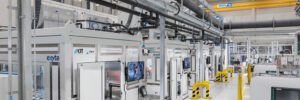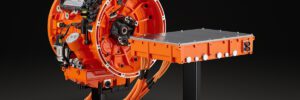
Researchers at the Karlsruhe Institute of Technology (KIT) have set up a robotic, modular and agile battery cell production system to enable production of customized battery cells in required quantities.
KIT researchers developed special robot cells in cooperation with Exyte, a German engineering company. Using a robotic automation system, the researchers have reached a level of flexibility previously possible only with manual cell production. This will enable companies to adapt to new technologies more quickly, KIT said.
The Karlsruhe Research Factory has installed four local dry rooms, or microenvironments, to protect moisture-sensitive battery materials. The volume that needs to be dehumidified is considerably smaller than in conventional dry rooms, meaning the technology has the potential to reduce energy consumption, according to Jürgen Fleischer, Head of KIT’s wbk Institute of Production Science.
The project team also created a digital twin software-based simulation of the production system, allowing scientists to analyze the scale effects of replicating individual microenvironments and to determine values for production-related variables such as optimum batch sizes. The simulation can also be used to plan the agile battery cell production system’s output. The physical system is connected with a database so that all processes can benefit from AI-based adaptations and improvements in the future.
The project received €19 million in federal and state funding—€14.5 million from Germany’s Federal Ministry of Education and Research and €4.5 million from Baden-Württemberg’s Ministry of Science, Research and the Arts.
“In Germany, we don’t have the conditions to be competitive in purely cost-driven mass production of cells and the associated mechanical engineering,” Fleischer said. “Opening the agile battery cell production system in the Karlsruhe Research Factory shows how we can stand out in the world market with highly flexible and resource-efficient production while targeting the high-margin premium segment and niche markets.”
Source: Karlsruhe Institute of Technology
from Charged EVs https://ift.tt/zuaMdXI

No comments:
Post a Comment